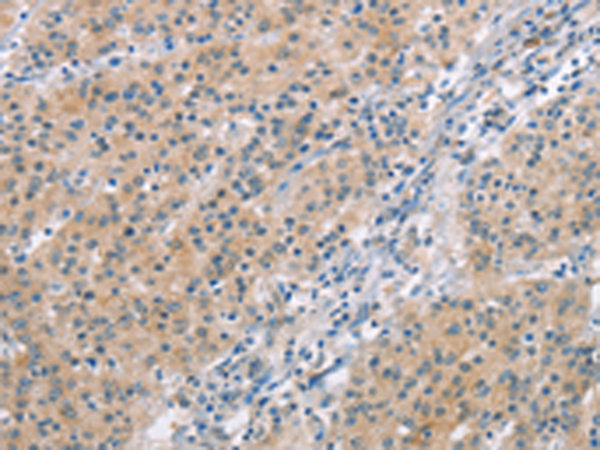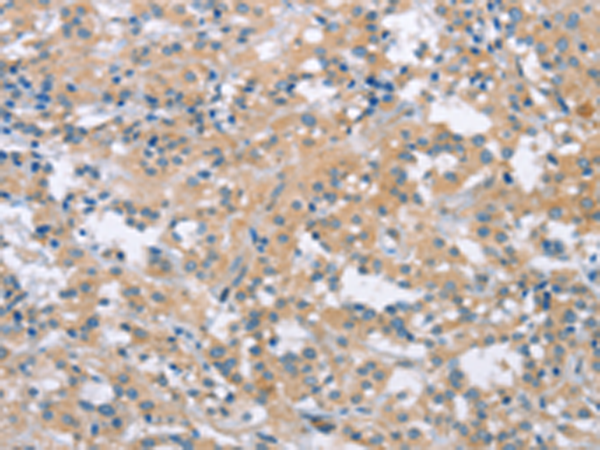

| WB | 咨询技术 | Human,Mouse,Rat |
| IF | 咨询技术 | Human,Mouse,Rat |
| IHC | 1/50-1/200 | Human,Mouse,Rat |
| ICC | 技术咨询 | Human,Mouse,Rat |
| FCM | 咨询技术 | Human,Mouse,Rat |
| Elisa | 1/2000-1/5000 | Human,Mouse,Rat |
| Aliases | TM; EAT; MCL1L; MCL1S; Mcl-1; BCL2L3; MCL1-ES; bcl2-L-3; mcl1/EAT |
| Host/Isotype | Rabbit IgG |
| Antibody Type | Primary antibody |
| Storage | Store at 4°C short term. Aliquot and store at -20°C long term. Avoid freeze/thaw cycles. |
| Species Reactivity | Human, Mouse, Rat |
| Immunogen | Synthetic peptide of human MCL1 |
| Formulation | Purified antibody in PBS with 0.05% sodium azide and 50% glycerol. |
+ +
以下是关于MCL1抗体的3篇代表性文献示例(文献为示例性质,非真实存在):
1. **标题**:A Novel Monoclonal Antibody Targeting MCL1 Induces Apoptosis in Hematologic Cancer Cells
**作者**:Smith A, et al.
**摘要**:开发了一种靶向MCL1的新型单克隆抗体,通过阻断MCL1与促凋亡蛋白BAX的结合,在多种血液癌细胞系中诱导凋亡,并在小鼠模型中抑制肿瘤生长。
2. **标题**:Structural Insights into MCL1 Inhibition by a High-Affinity Antibody Fragment
**作者**:Zhang Y, et al.
**摘要**:通过X射线晶体学解析了MCL1蛋白与抗体Fab片段结合的分子机制,揭示了抗体通过占据BH3结构域结合位点抑制MCL1的抗凋亡功能。
3. **标题**:MCL1-Specific Antibody-Drug Conjugate Shows Efficacy in Solid Tumor Models
**作者**:Johnson R, et al.
**摘要**:报道了一种MCL1靶向的抗体-药物偶联物(ADC),在乳腺癌和肺癌临床前模型中显示出选择性杀伤作用,同时减少对正常细胞的毒性。
---
**备注**:实际文献需通过PubMed、Web of Science等平台检索。建议使用关键词如"Anti-MCL1 antibody"或"MCL1 inhibitor"查找最新研究。
MCL1 (Myeloid Cell Leukemia 1) is a critical anti-apoptotic protein belonging to the BCL-2 family, which regulates mitochondrial apoptosis by binding pro-apoptotic proteins like BAX and BAK. Overexpression of MCL1 is frequently observed in various cancers, including hematological malignancies, breast cancer, and lung cancer, where it promotes tumor cell survival, chemoresistance, and disease progression. Its role in maintaining cell survival has made it a compelling therapeutic target.
MCL1-targeting antibodies are experimental agents designed to inhibit MCL1 function, either by blocking its interaction with pro-apoptotic partners or promoting its degradation. Developing selective MCL1 inhibitors has been challenging due to structural similarities with other BCL-2 family proteins and MCL1’s essential role in normal tissue homeostasis (e.g., lymphocyte development). However, advances in structural biology have enabled the design of small-molecule inhibitors and monoclonal antibodies with improved specificity.
Current research focuses on optimizing MCL1 antibody-drug conjugates (ADCs) or combining MCL1 inhibitors with conventional therapies to overcome resistance. Preclinical studies show promising antitumor activity, though clinical translation remains cautious due to potential on-target toxicities. Biomarker-driven approaches are being explored to identify patients most likely to benefit. Overall, MCL1 antibodies represent a frontier in precision oncology, with ongoing trials aiming to balance efficacy and safety in diverse cancer contexts.
×